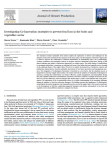Nasso M., Blasi E., Pezzoli F., Cicatiello C. (2024). Investigating Co-Innovation strategies to prevent food loss in the fruits and vegetables sector. Journal of Cleaner Production, 15/08/2024, vol. 467, p. 142984.
https://doi.org/10.1016/j.jclepro.2024.142984
https://doi.org/10.1016/j.jclepro.2024.142984
| Titre : | Investigating Co-Innovation strategies to prevent food loss in the fruits and vegetables sector (2024) |
| Auteurs : | M. Nasso ; E. Blasi ; F. Pezzoli ; C. Cicatiello |
| Type de document : | Article |
| Dans : | Journal of Cleaner Production (vol. 467, August 2024) |
| Article en page(s) : | p. 142984 |
| Langues : | Anglais |
| Langues du résumé : | Anglais |
| Catégories : |
Catégories principales 11 - COMMERCE ; 11.2 - Commercialisation. DistributionThésaurus IAMM CHAINE DE VALEUR ; FRUITS ET LEGUMES ; PERTE ; PREVENTION ; REDUCTION DES DECHETS ; INNOVATION ; ITALIE |
| Résumé : | The transition towards sustainable food systems implies the exploration of drivers and challenges for the adoption of innovative solutions by the operators on the value chains. The development of innovative approaches is critical to improve the collaboration of different stakeholders on sustainability topics. The Q-methodology combines qualitative and quantitative analysis to navigate subjective stakeholder perspectives, aiming to find shared strategies and enhance collaborative approaches on complex topics. This study employs Q-methodology to investigate stakeholders' viewpoints on reducing food losses in the Italian fruit and vegetable sector, focusing on the upstream phases of the supply chain. The aim is to explore the perspectives of producers, experts, and institutional representatives towards sustainable innovations in food losses prevention and management practices. The integration of technological innovation is described as a key factor, but the adoption process is hampered by structural supply chain burdens. The results enforced the adoption of sustainable technologies by operators, reporting that collaboration can enhance efficiency, quality management, and sustainability during fruit and vegetable production and distribution operations. Innovative solutions to mitigate food losses risk are driven by resource-efficiency network strategies that should imply a positive environmental and social performances. The application of the Q-methodology allows for a deeper understanding of the emerging challenges during the adoption of food loss reduction strategies. The findings reported the significance of collaboration, technological innovation integration, and sustainable practices across the supply chain. This research contributes to the development of effective, stakeholder-supported strategies and informs policymakers in the fruit and vegetable sector about different solutions to mitigate food losses. |
| Cote : | En ligne |
| URL / DOI : | https://doi.org/10.1016/j.jclepro.2024.142984 |







